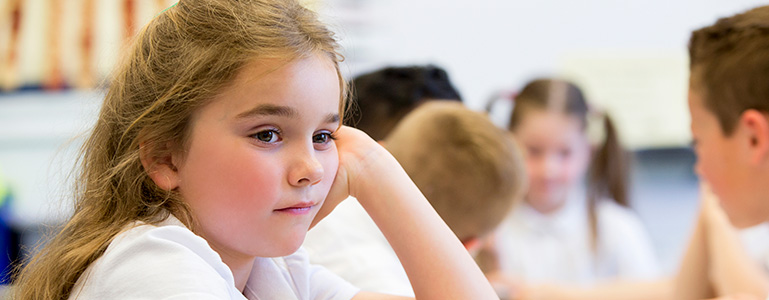- Do you find yourself constantly repeating directions and expectations?
- Is it hard to tell whether your child won’t do something, or can’t do something?
- Are you noticing patterns of the same mistakes being made in your child’s homework?
Every child has unique strengths and areas of weakness, but at what point does a particular set of challenges become a learning disability? The answer is not always simple. There is no single definitive trait found in a child or adolescent with learning disabilities, and subtle signs may not even become clear until the normal progression of academic demands outpaces a student’s capacities to keep up at their grade level.
So how do you know if your child may be impacted by a learning disability? Here are some signs to look out for, based on your child’s age and grade level expectations:
Preschool Years
- Communication delays (e.g., slow language development, difficulty with speech, communicating thoughts, or understanding what is being said)
- Difficulties with memory and routine (e.g., not remembering specifics of daily activities, not understanding instructions, or trouble remembering greater than one- or two-step instructions)
- Poor coordination and/or irregular motor development (e.g., delays in learning to sit, walk, color, or use scissors)
- Delays in socialization (e.g., not playing or relating interactively with other children)
Early Elementary School
- Problems learning phonemes (individual units of sound) and graphemes (letters, numbers). Struggles to blend sounds and letters to sound out words, or to remember familiar words by sight.
- Trouble forming and sequencing letters and numbers (i.e., reversals; can’t alphabetize). Ongoing problems with basic spelling and grammar.
- Difficulties learning math skills and doing math calculations.
- Poor memory or trouble remembering facts.
- Difficulty organizing belongings, info, and/or concepts.
- Trouble understanding oral instructions.
- Struggles to express oneself verbally.
- Loses or forgets things. May forget to turn in completed work.
Later Elementary School and Beyond
- Significant trouble planning out the steps and timelines for completing assignments, particularly long-term projects.
- Difficulty may be seen with reading comprehension and/or with organizing thoughts for written assignments or reports.
At each stage, there may also be related behavioral signs, such as distractibility, impulsiveness, trouble adjusting to changes, withdrawal, and/or low self-esteem.
Next Steps to Take
If you have noticed several or many of these signs, you will want to consider having your child evaluated for a learning disability. This may be called a psychoeducational or neuropsychological evaluation, which is performed by a licensed psychologist with specialized training and expertise in psychological/neuropsychological assessment.
If your child is significantly behind academically, they may be eligible for an evaluation through their public school. If your child attends private school, you may be eligible to obtain an evaluation for your child at the public school they would have attended. Be aware that public schools usually provide only a basic/limited evaluation and typically require significant evidence of academic struggles (e.g., performing one or two years behind grade level expectations) before considering testing.
Working with an outside evaluator can often be a better approach in order to truly understand your child’s unique strengths and challenges, get an accurate diagnosis, and obtain recommendations tailored to best support your child.
Please reach out to the Center for Children and Youth to learn more about our comprehensive psychoeducational and neuropsychological testing assessment services. Our psychologists have specialized training in conducting testing and evaluations for children and youth, ages two through young adult. Comprehensive assessments may include diagnostic clarification about concerns related to learning and attentional challenges, as well as social-emotional and behavioral functioning. Our assessment approach is strengths-based, comprehensive, and collaborative.
Seeking other resources to help your child thrive? The Center for Children and Youth clinical team specializes in expert care and support for children, adolescents, and their families. We offer child, adolescent, and family therapy, pediatric psychiatric and medication consultations, and occupational therapy evaluations/services. Schedule a free consultation today.



